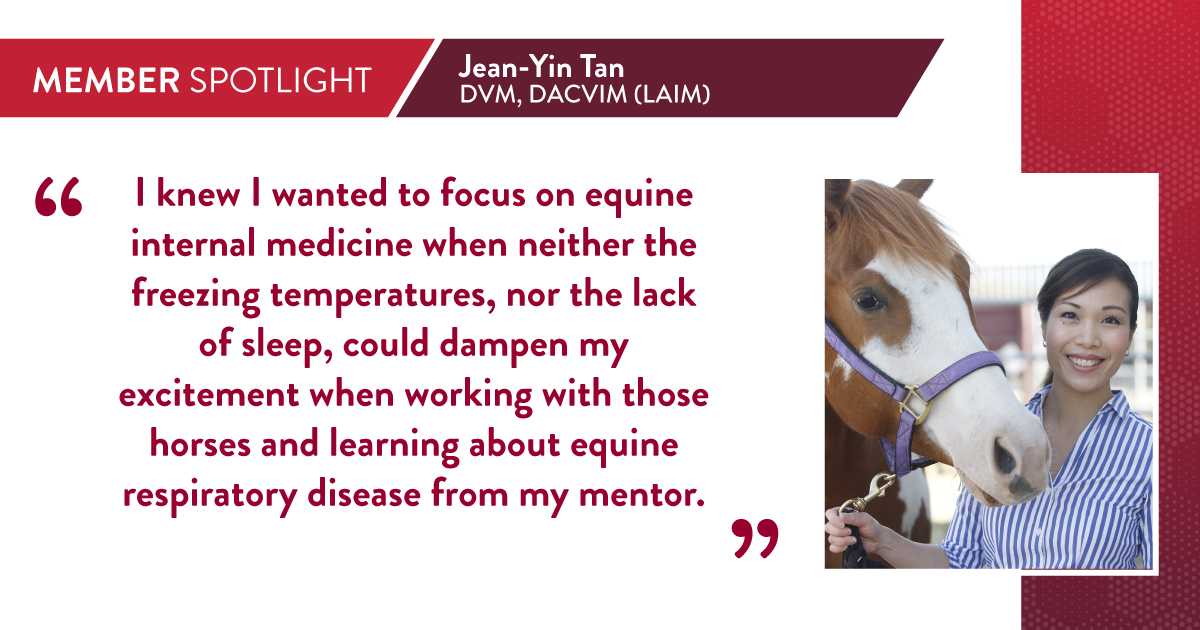Member Spotlight: Jean-Yin Tan, DVM, DACVIM (LAIM)

Jean-Yin Tan, DVM, DACVIM (LAIM) (she/her)
What inspired you to become a Board-certified veterinary specialist?
I know a source of pride for veterinarians is our ability to treat more than one species. While I love the range of opportunities and the wide pool of knowledge that the veterinary profession offers, I was drawn to the idea of absorbing all the knowledge, techniques, and skills to truly excel and make it to the top of my profession in one area. Specialization offers that opportunity – to focus on something until you become exceptionally good at it.
Are there any resources or pieces of advice that helped you along the way?
When reflecting on my career “successes” the other day, I also had a chance to reflect on my career “failures”. They are almost equal in number, with every success made sweeter by a past failure. I would like early career veterinarians to take solace that even if things get hard at times, when you find something that you’re truly passionate about and that drives you, have faith that your knowledge, creativity, and skills will allow you to find a way to turn every failure into a success and persist beyond any obstacle. I finished my residency in 2008 during a recession that worsened for the equine industry over the next few years. It was a struggle to find employment, yet I am thankful for every barrier that presented itself during my career because I would not be in the position I’m in today without them.
Is there a story or experience that stands out in your mind that reaffirmed your decision to work in specialty veterinary medicine?
I came to vet school with the intent of working with horses in the future, but I didn’t know to what extent and in what capacity. While at school at Cornell University, I had the opportunity to work with Dr. Dorothy Ainsworth, a board-certified large animal internal medicine specialist, on research relating to equine asthma. This involved early morning procedures at the Equine Research Park at 5:00 am in the dead of winter in Upstate New York prior to class, and it was often still dark by the time we finished our work. I knew I wanted to focus on equine internal medicine when neither the freezing temperatures, nor the lack of sleep, could dampen my excitement when working with those horses and learning about equine respiratory disease from my mentor.
What is something you wish the general public knew about veterinary specialists?
For almost five years I was Managing Partner of a combination general practice/specialty equine clinic, which I owned along with a board-certified surgeon. I recall one of the clients commenting that two of us combined made a whole vet. I had to correct them that we each had the training and skills of a full general practitioner vet, yet we had “superpowers” when it came to each of our specialties.
How is specialty veterinary medicine paving the way for advances in veterinary science?
Specialists are at the forefront of advances in veterinary medicine, both in clinical medicine and in research. By spending our time with the complex cases, the puzzles, and the sickest patients, we often find ourselves asking questions to which there is not yet an answer in veterinary medicine. This means that we innovate, we connect with colleagues, or we engage in research to try to answer those questions. We’ve been equipped in our training to ask the hard questions and to search for answers to the unanswerable. This is what paves the way for advances in veterinary science.
When it comes to increasing diversity in veterinary specialty medicine, what kind of resources or changes would you like to see from the ACVIM and/or similar organizations? To phrase it another way, how can the ACVIM better support its diverse members?
During this time when we are experiencing a veterinary shortage, we as a profession need to rise to the challenge of addressing the diversity issue in veterinary medicine so we can welcome people from all backgrounds into the profession. I believe veterinary organizations can play a powerful role in modelling diversity, equity, and inclusion in our practices, structure, and leadership, to improve the profession from the inside out. A critical self-assessment, a systematic strategic plan, strong implementation, an unwavering commitment towards the journey of equity and justice, and continual assessment of outcomes, will allow organizations to best serve their diverse members and future generations of veterinarians. I am thankful to be a part of a movement that aims to address some of these challenges. As the inaugural Chair of the AAEP DEI Taskforce (2020-2021), a founding member of the ACVIM DEI Taskforce (2020-2021), a founding member of the AAVMC-AVMA Commission for a Diverse, Equitable, and Inclusive Profession, and now a member of a newly formed DEI Strategic Planning Task Force for the ACVIM, I am excited to see underrepresented members of the community gain a voice and become empowered to initiate positive change for the future generations.
